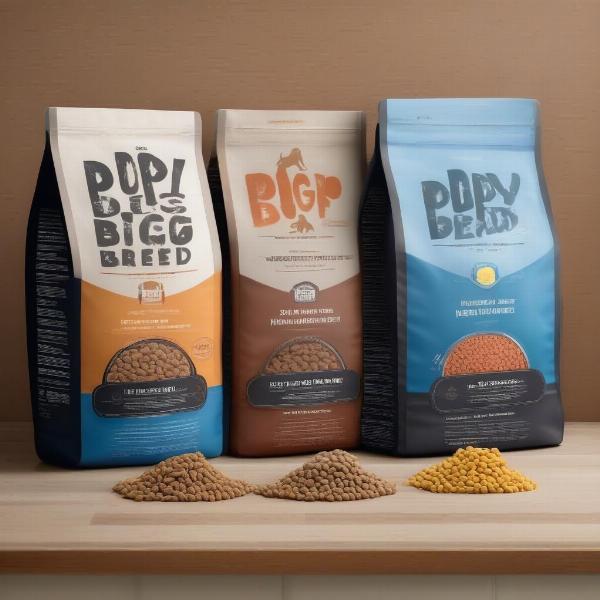Big breed dog food is specially formulated to meet the unique nutritional needs of larger dogs. Choosing the right food is crucial for their overall health, development, and longevity. From puppyhood to their senior years, a proper diet plays a vital role in preventing common health issues and ensuring your gentle giant thrives. This article will guide you through the essentials of big breed dog food, helping you make informed decisions to keep your canine companion happy and healthy.
Understanding the Needs of Big Breeds
Larger dogs have different dietary requirements compared to their smaller counterparts. Their rapid growth during puppyhood necessitates a diet carefully balanced to support healthy bone and joint development. Big breed puppy food often contains controlled levels of calcium and phosphorus to prevent skeletal problems later in life. As they mature, maintaining a healthy weight becomes crucial for preventing joint strain and other health issues. Therefore, big breed dog food is often formulated with specific calorie content and ingredients to promote lean muscle mass and manage weight.
Key Ingredients in Big Breed Dog Food
Look for high-quality protein sources like chicken, lamb, fish, or beef as the primary ingredients. These provide the building blocks for strong muscles. Healthy fats, like omega-3 and omega-6 fatty acids, are essential for skin and coat health, as well as cognitive function. These can be sourced from fish oil, flaxseed, or chicken fat. Carbohydrates provide energy, but opt for complex carbohydrates like brown rice, sweet potatoes, or oats rather than simple fillers.
“Choosing a food with glucosamine and chondroitin can be beneficial for joint health, especially as your large breed dog ages,” says Dr. Amelia Shepherd, DVM.
Choosing the Right Food for Different Life Stages
- Puppies: Big breed puppy food should be formulated for controlled growth to prevent developmental issues. Look for formulas specifically designed for large breed puppies.
- Adults: Adult big breed formulas focus on maintaining a healthy weight and supporting joint health. Choose a food that balances calorie content with essential nutrients.
- Seniors: Senior big breed dogs often benefit from food that’s lower in calories and higher in fiber to support digestion and maintain mobility. Joint supplements may also be beneficial.
“Always consult your veterinarian before making significant changes to your dog’s diet, especially if they have pre-existing health conditions,” advises Dr. David Lee, DVM, PhD.
 Bags of dog food for different life stages
Bags of dog food for different life stages
Common Big Breed Health Concerns and Diet
Hip and elbow dysplasia, bloat, and arthritis are common concerns for large breeds. Choosing a big breed dog food can help mitigate some of these risks. Weight management is crucial, and feeding a balanced diet can contribute significantly to overall health.
Conclusion
Selecting the right big breed dog food is a critical aspect of responsible pet ownership. By understanding their specific needs and focusing on quality ingredients, you can help your large breed dog live a long, healthy, and happy life. Remember to consult your veterinarian for personalized advice tailored to your dog’s individual needs.
FAQ
- What is the difference between big breed and regular dog food? Big breed dog food is formulated with controlled levels of calcium and phosphorus to support healthy bone growth in puppies and often contains ingredients to support joint health in adult and senior dogs. It may also have a different calorie density to manage weight.
- When should I switch my puppy to adult big breed food? Generally, you should switch to adult food around 12-18 months of age, but consult your veterinarian for the optimal timing for your specific breed.
- Can I give my big breed dog supplements? Yes, but always consult your veterinarian before introducing any supplements to your dog’s diet.
- How much food should I feed my big breed dog? Follow the feeding guidelines on the dog food packaging, but adjust portions based on your dog’s activity level and body condition. Regular check-ups with your vet can help ensure your dog is at a healthy weight.
- What are signs my big breed dog’s food isn’t right for them? Signs can include digestive issues, skin problems, dull coat, changes in energy levels, or reluctance to eat.
- Is grain-free dog food good for big breeds? While some dogs thrive on grain-free diets, it’s essential to discuss this option with your vet, especially for large breeds, as some research suggests a potential link between grain-free diets and heart issues.
- What should I do if my big breed dog is a picky eater? Try different flavors or textures of big breed dog food, or consider adding warm water or a small amount of wet food to their kibble.
ILM Dog is a dedicated resource for dog owners worldwide, providing expert advice on all aspects of dog care, from breed selection to nutrition and training. We offer practical tips and insights to help you nurture your canine companion and build a strong, loving bond. Whether you’re a seasoned dog owner or just starting your journey, ILM Dog is here to support you every step of the way. For expert advice tailored to your dog’s needs, reach out to us at [email protected] or call +44 20-3965-8624. We offer valuable information on various dog breeds, health care, training, nutrition, and products to ensure your dog’s well-being. Connect with ILM Dog for a wealth of reliable resources and expert guidance to enhance your dog’s life.